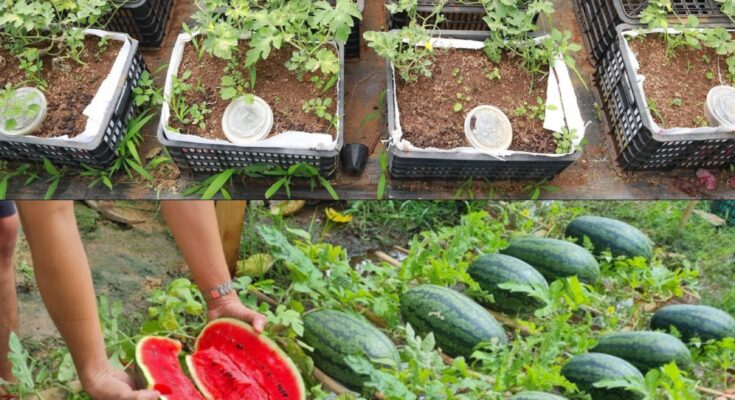
Growing Sweet Watermelons: A Guide to Delicious Summer Delights
Introduction: Few things symbolize the joys of summer more than a sweet, juicy watermelon. Whether you’re planning a picnic, barbecue, or just want a refreshing treat on a hot day, growing your own sweet watermelons can be a rewarding experience. In this article, we will provide you with valuable tips and techniques to cultivate mouthwatering watermelons in your garden.
- Select the Right Watermelon Varieties:
- Choose watermelon varieties known for their sweetness and flavor, such as ‘Sugar Baby,’ ‘Crimson Sweet,’ or ‘Charleston Gray.’ Be sure to consider the size and maturity period that suits your growing season.
- Soil Preparation:
- Watermelons thrive in well-draining, loamy soil rich in organic matter. Work in compost or well-rotted manure to improve soil fertility and texture.
- Ideal Growing Conditions:
- Plant watermelons in a sunny location that receives at least 6-8 hours of direct sunlight daily. They love warmth, so ensure your growing season is long enough.
- Proper Spacing:
- Space watermelon plants about 3-5 feet apart in rows with 5-7 feet between rows. Watermelons can spread, so providing adequate space is crucial.
- Soil pH:
- Watermelons prefer slightly acidic to neutral soil with a pH range of 6.0 to 6.8. Test your soil and adjust the pH if needed using lime or sulfur.
- Watering:
- Keep the soil consistently moist but not waterlogged. Provide deep, regular watering to promote healthy root development and prevent fruit splitting.
- Fertilize Strategically:
- Start with a balanced fertilizer when planting and apply a low-nitrogen, high-phosphorus, and high-potassium fertilizer when the vines start to flower and set fruit. Follow package instructions for application rates.
- Mulching:
- Apply a layer of organic mulch, such as straw or black plastic, around the base of the watermelon plants. Mulch helps conserve soil moisture, suppress weeds, and maintain even soil temperature.
- Support for Growing:
- Consider using a trellis or support system for vertical growing in limited space gardens. This can also help keep the fruit off the ground, preventing rot.
- Pest and Disease Management:
- Regularly inspect your watermelon plants for signs of pests like aphids or diseases like powdery mildew. Implement organic pest control methods and preventive measures as needed.
- Pollination:
- Watermelons require pollination for fruit set. Encourage pollinators like bees to visit your garden by planting pollinator-friendly flowers nearby.
- Harvest at the Right Time:
- Watermelons are ready for harvest when the tendrils near the fruit stem turn brown, and the bottom of the fruit changes from shiny to dull. Thump the fruit; it should sound hollow, indicating ripeness.
Conclusion: Growing sweet watermelons can be a delightful and delicious addition to your summer garden. By following these tips and providing the right care, you can enjoy a bountiful harvest of juicy, refreshing watermelons that will be the highlight of your summer gatherings. Happy watermelon growing!


